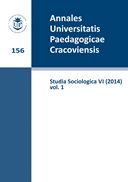Teologia polityczna dżihadyzmu w perspektywie antropologii polityki
Jihadist political theology from the perspective of the anthropology of politics
Author(s): Robert BorkowskiSubject(s): Social Sciences, Sociology, Theology and Religion
Published by: Wydawnictwo Uniwersytetu Komisji Edukacji Narodowej w Krakowie
Keywords: political anthropology; islamic fundamentalism; jihad; theology of revolution
Summary/Abstract: Fundamentalists reaching for terrorist violence believe that they are pursuing theology of the end of time and are a tool for God’s judgment directed against the sinful world. According to the theory of Rene Girard’s eschatological violence fundamentalist religious stereotyping passes three phases: the crisis – the perpetrator – victim. In the political theology of Al-Qaeda it is hard to find a rational (in the Weberian sense) political agenda. In addition to a strong expression of hatred for Western civilization combined with the non-recognition of the UN system and international law, we find only demands of the withdrawal of U.S. forces from the Arabian Peninsula and the destruction of Israel and the vague idea of the revival of the caliphate following the Islamic revolution in Muslim countries. These demands are vaguely remaining in the sphere of religious-political utopia rather than a realistic political strategy.
Journal: Annales Universitatis Paedagogicae Cracoviensis. Studia Sociologica
- Issue Year: VI/2014
- Issue No: 1
- Page Range: 83-98
- Page Count: 16
- Language: Polish

